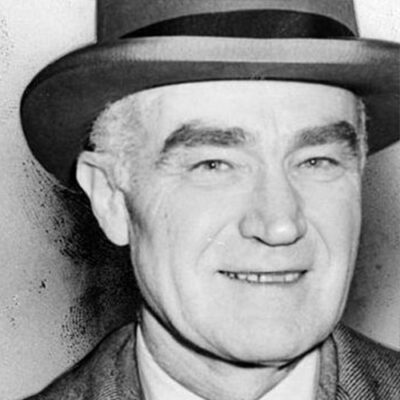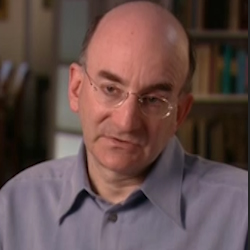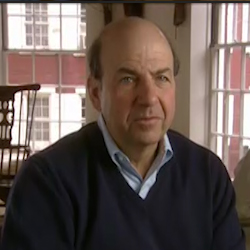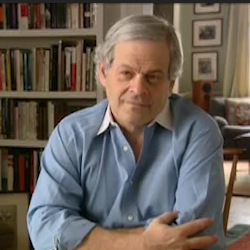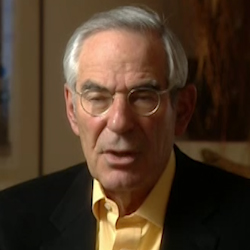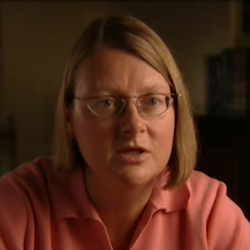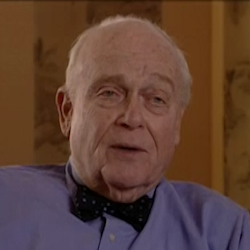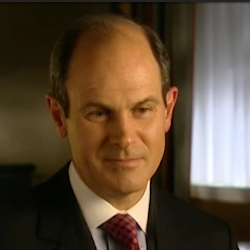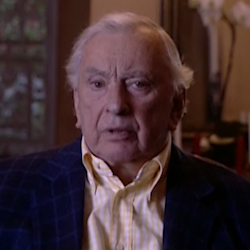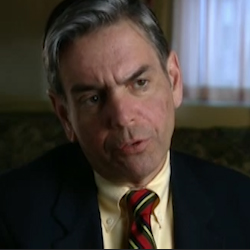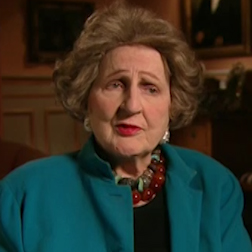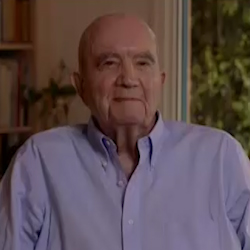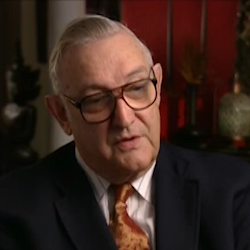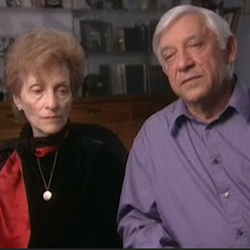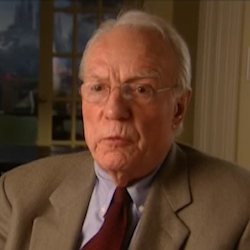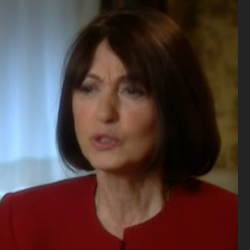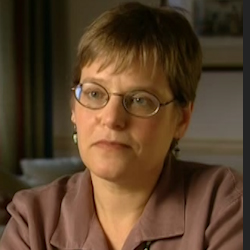Speaker Tell what it was as well. But back to McKinley.
Speaker You’re not gonna live under it, but it was like it was almost like his magazines were were a cultural pride project.
Speaker Oh, I think so. Probably more so than moneymaking, making a lot of stories about him and his indifference to the amount of money. Like to be rich. You’d like to be have the convenience of money. But when it came down to it, the piling up of money was a bore, too, in the process. He did he you know, he didn’t much worry about it once it got going.
Speaker You actually told us, in fact, along those lines, you mentioned that there was you were with him.
Speaker I was not. This is a story. It’s probably the one at the convention.
Speaker No. Oh, no. I think he was at the White House and there were a bunch of CEOs.
Speaker Yeah, I guess it’s group up on a salary and we’re outside steak fry. Yeah. You tell us that’s not share. Yeah. You just have to remind me what to what to say and what not to say. You know what you want.
Speaker Yeah. Yeah we do. Okay. So if you could tell his reaction to being with a group of people and remember also that my questions are not going to be so I need to preface it with some explanation.
Speaker Yeah. Okay.
Speaker Let’s buy. So here on here, it’s good.
Speaker You’re looking great. But both of them. It’s all right.
Speaker So along the lines of what what his. You know, his feelings about power were story with those people.
Speaker Did you. Did I tell you to get a hold of Stan Curnoe? Did you ever get hold of him? No, I did. I did speak things down. OK. Because he had some great stories from Mountain Taiwan, right? Yeah. The famous one about the luggage, the new luggage that loose and they landed in Taiwan. And there was some confusion. I don’t know. They took the luggage and Luce was afraid he was going to lose it or they never see it. He said, well, will they lose it? Stan, Kano’s response to lose was, well, they lost the mainland, didn’t.
Speaker A lot of our great remembrances.
Speaker That’s a good thing. Yeah. So what about Ike’s?
Speaker Right now we are. Oh. Oh, I didn’t realize it. Well, of course, Luce loved Dwight Eisenhower. He helped create him. So matter of fact, I think that came the closest to any time in Time magazine’s life in which we became a propaganda instrument and went to the convention, our editors and our reporters. And it was just all out for Dwight Eisenhower. He wanted to really recreate that era of Republican presidents that preceded World War One. And after a little while and so Eisenhower was his creation and he used to come down a lot, of course, to meet with Ike. But towards the end, things changed a little. I as the young reporter that got the job of shepherding him around a lot of the old hands and gotten kind of weary of his talk about Presbyterianism and.
Speaker And that’s that’s why it ended up. But I was fascinated with it. I liked it. I enjoyed it thoroughly. And I remember one night he was asked up to one of Ike’s steak fries that he had up on the top of the White House, the roof outside the solarium.
Speaker And when he came down, we got in the limousine and Luce was saying, you know, he said it wasn’t much of an evening. I didn’t like it that much. She said that crowd he has around me said there are too many corporate heads and bankers and that he said all they want to talk about is money and golf. He said, hi, quit rhetoric, talk about that things. And as you know, Luce wanted to talk about religion, philosophy, books. He had this great variety of interests. But when he ran into these people and members of Ike’s cabinet, it was kind of a one subject evening. I think when you’re dealing with old engine Charlie Wilson, who was our secretary of fence, and then later, Neil McElroy, these guys, as near as I could tell, nice man, sort of, but not that broad in the mind.
Speaker You mentioned dad taking him around. What?
Speaker A lot of people mention that when it comes to a bureau. So the way he blows into town and the terror that it’s struggling to.
Speaker Well, I wouldn’t say it was terror.
Speaker Henry Luce used to come to town and we would naturally, he wanted the services of the bureau. He liked the people. He liked to talk to them. He liked dollar conveniences, the limousines, the airplanes. He liked the staff to try to arrange all of things for him. He wanted to see certain people. So when he came to town, it was kind of a novem. And I is a young young reporter used to help shepherd him around town. And you’d hire the big limousine. You make sure you have the lunches and that sort of thing. You would make sure that he had the proper appointments. He would tell you the people he wanted to see. And generally it started out with the president. And the first president that I took him do, of course, was Ike. And then and then through Kennedy and Johnson. And I can’t remember exactly when he died. I can’t remember being with him to see Nixon that perhaps had happened. But the last one I recall was LBJ, and he just thoroughly enjoyed it. And then he would make his other rounds.
Speaker There might be a US senator or a congressman. And I can recall one time he came and he went up to see Carl Month of South Dakota Senator Kalima and Homer Kape, part of India. Well, we have bright young liberal reporters, of course, considered them ignoramuses. I think they I think they were, as a matter of fact. But I said something to that effect after he’d come out of the offices of these two deluce. And I remember he was he was a bit disturbed by it. He fixed these old steely eye on me and said, hey, wait a minute. He said, everybody has a story behind him. Every person, he said, particularly those who have position of influence, said, you ought to listen. You you got to hear what they have to say. You want you want all sides to this. He gave me a little lecture about reporting, and he was absolutely right. I never forgot it. Don’t matter how stupid they may seem to me or to others, there’s something there that got them where they where they where they are at the moment than Homer Capehart and Carl month or two that he went to see. And he also went to see Kennedy. We lost him when he went to see Kennedy. That was one of the bureau’s gun. Funny stories. He went up. We had this appointment. He was supposed to seat Kennedy. And I had it all arranged with Ted Sorensen, his Kennedy’s principal aide. And they said this was preceding the 1960 campaign. Kennedy was just gearing up for all of that. And so we got him up there. And I think that was when the Labor Reform Act, Landrum Griffin, was on the floor of the Senate. That came after the racket’s hearings when John MacLellan, with Bobby Kennedy as the counsel looked into all the corruption with Dave Beck and Jimmy Hoffa and that sort of thing, the rackets at that time. And they had the Labor Reform Act up and Kennedy was the floor leader. And so Kennedy was busy and I’d arranged it and he went up to see him in his office. And of course, Kennedy couldn’t come over on that day and then loose Italy’s fingers a while there. And then I got him over to the gallery so he could watch the debate.
Speaker And then I had to go someplace and I actually loose was having a pretty good time. And he liked that he’d get, like, you know, the people down there. And he was watching Kennedy and Kennedy was signaling they and all.
Speaker But Kennedy was loose from the floor duties to come up and see Henry Luce so loose, got hungry. So he wandered off someplace up on the hill to get up. You get a sandwich and he didn’t know where he was. And then I didn’t know where he was. I lost. And what happened as he went over to some drugstore and got up on the counter and had a sandwich and had a Coke or whatever he had, and then he came back to the Senate. And by that time, of course, they were on the jury. And so for the moment, we we were rather distraught because we weren’t sure where Lewis was. But he showed up in the bureau.
Speaker He was, I think, at heart, just a reporter. He did he get live off the land. He knew his way around. And he actually, though he never saw Kennedy, he kind of had a fun afternoon listening to the debate and just watching that it wouldn’t flow up there.
Speaker What about his you know, his relationship with Kennedy? Given that he’s such a. Dyed in the wool Republican. What was his relationship?
Speaker You know, it’s kind of bittersweet in its own way. As you know, he wrote a Forward for Pickaninnies book or ed or something like that. Way back there. It Profiles in Courage or why England slept. I can’t remember one of those he was involved with. And then, of course, he watched the nomination night with all Joe Kennedy.
Speaker I don’t think he liked Joe Kennedy, but man of great means and power. You know, they kind of seek other’s company. And he watched it that night and was thrilled with Kennedy speech, his acceptance speech out in Los Angeles that night. And and, of course, that the relationship with the family had gone back a long ways. And I think he had he was a he was very admiring of John Kennedy, his prowess as a as a politician, as a tech tactician and in politics, that sort of thing. He liked team. He liked his mind again. He had a man who could talk literature. He had a man who could talk history so that that intrigued him. He didn’t like Nixon, which was not unusual in those days. There were a lot of supporters of Nixon that didn’t really like that much, but he liked his philosophy. Of course, the old Republican idea, hands off. Anything’s possible. We rich guys got here on our brains, our and our sweat. Not not good luck, as I always tended to suggest. But anyway, he liked the Republican philosophy. But he, like Kennedy, is a person who told me that once he flew in and I can’t recall whether that was in the campaign or after Kennedy had become president. But he said, you know, I just like that guy, said I never liked Nixon and never liked. He said I could I can understand where he came from. But he said I never liked Nixon. And he said that, you know, Jackie was there. And. And I guess it was Caroline, the one of the babies was there and Jackie. And he said just attractive people. He said, I really like that. I think that was his position. And that I and I can remember we had before during the campaign. The time editors loosen the time editors always like to have the candidates come in and talk.
Speaker And he was far more thrilled with Kennedy. I got him to come down to to New York, where they went up the legendary thirty fourth floor, you know, and everybody that was the martini drinking time. And as I recall, that served one the janitor there, somebody said, no, no, he doesn’t want one candidate. He trying to be a good guy, stood there with looking uncomfortable, sparked it. He didn’t drink martinis. But it to his lips. And I was over there and I was laughing about the whole thing. The rest of these guys, you know, are a bit tiddly because that was what you did in New York. If you’re a big editor in those days, you drank a lot. And then he had Nixon down, of course. And Nixon. Nixon had his view of the world and it was very impressive. But as a man, he was just stiff. You know, he’s a mythic misanthrope. I never. Nobody understands how Nixon got in the politics, of course. But Kennedy made it in personal terms a far greater impact at that time. And that and that was Luce’s position, pretty much the same thing.
Speaker So when it came time for the endorsement in the 1960 campaign, how did how did that decision come about?
Speaker Well, the endorsement of the Luce empire, I guess I would have to say, went through Life magazine. That was the editorial page. We didn’t do that in time. I don’t remember whether Fortune did it. I don’t think so at that time. So it was the editorial in life that was kind of a strange thing. We had and we had always been so that’s so rabidly Republican that nobody thought there would be any difficulty with this at all. But but Kennedy used his connections with with the Luce family, with with the magazines, and that to kind of put pressure on to try to bring about even coverage of the campaign to start out with. And it was, by the way. See, I was down at the end of the food chain. I was thick on the beat. Who was riding along on the campaign. And in between where? About 20 editors of various kinds. And that kind of funneled things down. We had that was the period 1960 when we were changing really at the top. Luce was being really beginning to ease out a little bit and handily. Donovan had a big say in that in that time. And then one of the old time editors, auto fur bringer, who got a brain aneurysm and was taken out and he was replaced by by somebody a good deal more liberal, Tom Griffith, than he was. And so you had really this whole chain of command. We I think everybody kind of felt it was time to get out of that that mode of being a Republican House sargen. And I think it was fair coverage. But when the time came for the endorsement, there was kind of a struggle. As a matter of fact, I didn’t know anything about it. But the editors had made an arrangement. And you have to remember the James Shepley, who is a big time a guy before the campaign had become Richard Nixon’s principal speech writer, organizer or whatever it was up there. And so suddenly at it, if the word comes down that Nixon is going to have a big piece in Life magazine, either the next week or that week, I forget which. And nothing has been asked of Kennedy. He called me. I forget where we were, did just raised hell about it. You know, I said, what is this? Now, come on, you guys going to enter this world of real world of 1960. You’re going to be in this. Are you gonna do with the old things? He said? No. All right. What do we do? I said, well, I agree with you. If Nixon has a base, you ought to have a piece. And I said, I’ll see what I can do. Cause it was beyond me. It was over my head. I called up and said, Look. Kennedy called me. Well, by that time, Kennedy, it got loose himself and said, look, you know, let’s let’s be fair about it. All right. Well, then they did. And they had they had the two pieces, but that didn’t affect the endorsement. John Jesup wrote the editorial endorsing Nixon. It was fairly evenhanded, pretty good, restrained, I would say, as I remember it. And and we endorsed him. And that was traditional. I mean, you know, it was kind of in in the really along the old traditional way of time. However, I have to say that in the coverage, I thought we were excellent. I thought we were we were quite fair. As a matter of fact, both Nixon and Kennedy, when the campaign was over, did tell me that they thought they did not. Now, Kennedy didn’t like it, that we endorsed Nixon, but he said he thought the coverage had been fair and Nixon crushed him like it because he’d lost. But he, too, later on, years later, told me he thought it had been it had been fair coverage and he’d gotten a good shake with Tom. I’m very proud of that. Is the guy that was doing the reporting and getting the hard facts in there. And I have to tell you that I was I was probably out of line. I was pro Kennedy. I’m a man. I just like the guy. And I thought he stood for what was right. I thought his technique was better. And like virtually everybody else knew Nixon, at least in the in the media. I liked it better. That’s all. And so he got all the breaks I could give him. But nevertheless, I think we gave him a pretty even hand in that campaign.
Speaker Did you run into as a reporter or as the man on the scene? Did you run into what was reputed to happen to a number of writers? Who found out that when? By the time their dispatchers or their reports got through the editing process that their coverage had been changed.
Speaker Not that much. No, that was one of the old standards of Time magazine, one of the old complaints. We all used that some time and with some justification. No, you’re right. We were really researchers. Basically, we wrote these voluminous files about the facts behind. And as you know, the big machine in New York, homogenous, homogenized it. It was all packed in the way they wanted it. And that did happen. Reports from the ground had happened not only in politics. That happened in wars, that happened in many things. New York counterview. And they just imposed that even on their reporters.
Speaker And despite the facts, that didn’t happen that much in 1960 when I was a board here and there. Did they you know, you would you’d be there and and see it and hear it, smell it, feel it.
Speaker And you’d say, well, here’s what what I saw. And then it would come out just a little bit different, but not too often. And I have to say sometimes if you’re reporting a story or a phenomenon, concept, for instance, about America and politics and you have 30 correspondents from all over the country filing, and that all comes in, there is a different view. Sometimes if you’re up to close, you’re wrong. That’s all that’s happened to me several times along the way in my career with presidents and others that I just got up too close.
Speaker I’ve got to really weary. I guess in some instances I was just wrong about things. And in the campaign, I remember back and forth, we weren’t quite sure the way it would go. And I went to Cleveland with with Nixon and the crowds were just humongous. They were immense. And I was convinced based on that and the leaks or all the spin that was put up, that Nixon was ahead. And then, of course, I went someplace with Kennedy.
Speaker The crowds were equal. So I really didn’t know.
Speaker And when it was the beginning in those times of what I call fusillades journalism, in which we could we were cooped up in in these airplanes and airports and then the motorcade and we would see that part of the bands, the speeches that but we didn’t know what was happening out out in the states around there. Television made it so that a presidential visit in a certain area would be covered in five states. And the impact there we didn’t have a clue about.
Speaker So I was sometimes just plain wrong about things. But it nevertheless, we all thought we were right. And of course, when that occurred, we can complain. And of course, a lot of people use that to their advantage. I tried not to, but I suppose now than I did when something like that occurred, I’d say, oh, my goodness, that’s terrible. Somebody else did that or those editors did.
Speaker They’re easy out. Well, it wasn’t easy, but it didn’t take long for me to see that.
Speaker That’s not good. If you rise or fall on the basis of basis of what’s in the magazine, you try your best to make it right to influence it now and then you’re you’re violated. But it was changing by that time. And I think Luce understood that.
Speaker What you mentioned, the it being a great quote unquote, Republican House, FORGAN did it. Was there anything sort of.
Speaker Discomforting about the fact that so many time writers went on to be speech writers for AI or for Nixon.
Speaker Oh, gosh. Yeah, I suppose at that time. At that point, I joined it.
Speaker And even in the years before was kind of the general General Motors of journalism snares. I could tell everybody went through time at some point. John Kenneth Galbraith developed his style as a fortune writer. John O’Hara was a time writer. John Hershey was a life writer. Teddy White, as you know, is one of our correspondents. So I know that didn’t bother me. Some of them became speechwriters. John Steel was a speechwriter. He was our bureau chief for Adlai Stevenson at one time.
Speaker And he wrote a book on the old Michigan senator. But the bipartisan one, I forget. But anyway, they were all over the map. Probably a few more went to the Republican side. But not that many. No, I think that basically Time Inc, if you take the writers, the lower ones, not the top editors, but you take the guide to the second tier and the correspondents in that, I think they were the standard good old American liberal Democratic journalists, about 90 percent.
Speaker So how did that work out? The dynamic of. You’ve got this liberal sort of. Layer. And then you’ve got this staunchly Republican layer. What was the dynamic where you’ve kind of worked it out there?
Speaker It wasn’t bad. Presumably the story isn’t. I think they were basically factual. Now, then I’d be a little twitch in that. But as I say, it was changing when I got there and I looked back through some of the New Deal stuff, it wasn’t bad. I think Lewis understood the power, the necessity of Roosevelt and the New Deal. I think there’s no question Loose Loose had had a great mind, really. To be fair, to be factual, to be probing, to be insightful. Except what he got hung up special things like China, Presbyterianism and the Republican Party. You’d get hung up on on that someway and it would do a man. But if you got an if you’ve got an issue like civil rights, there was no question he was out in the forefront of civil rights, didn’t have anything to do with party. And I think science space, the space race, same thing, stay up so that that in that world there wasn’t much trouble.
Speaker I was a stringer in Omaha, Nebraska, for instance, and we got stories in about about every week or so. Not that often, but every month out there. And I think that reflected looses interest around the country. And that was that wasn’t tilted in any way, shape or form.
Speaker What was the difference? You covered the presidency close up, but the presidency or the White House was. From the beginning, the lead. Articles in the magazine. What was the difference between the way they covered the presidency in the old days versus when by the time you came on board and were right there?
Speaker Well, the actually before I arrived and I had some some of the time when I was there, they had that old format in which they had the Presidents Week and then they had Congress week and then they’d have something from the Supreme Court.
Speaker And we more or less summed up in that nation section. What happened in the big in the big events in Washington as well as around the country? And there was the title. So what we what came to be known in the trade as pretty sweet PR RDX week was a standard feature every week, and mostly that was just factual. Only when it got into really tough, tough things or loose took took an interest, you know. Did we get cute and inject the old language in that sort of thing? Because I think I reported on it many times. And and Congress weak at first. That’s I was covering the Congress and it was, you know, about bills and about this and about there. And they as I say, they had fun with it sometimes at golf games of IHC and that sort of thing. Basically, it was very it was very favorable. But I don’t think it was wildly enthusiastic. In other words, it wasn’t it wasn’t so stilted as to be an. They liked Dich. That’s plain. And they and they rationalized for him and they tried to explain for him. It wasn’t like today’s environment in which you look at a president, whoever he is, to see what the mistakes, what mistakes were made. There was great tolerance, great sympathy for almost anybody in the news at that time. Unless you had a Hitler or you had Jimmy Hoffa or somebody like that. It was it was far more mellow sort of approach.
Speaker But what’s curious to me when I look at. The coverage of the presidency and Time magazine during your tenure. And I look at the coverage of the presidency back in the 20s. It’s interesting because, you know, I look at your look at your coverage and it says, well, you know, it certainly looks like he was there. And then I look at the coverage in the 20s where they were in New York, and they certainly made it seem like they were there.
Speaker And you mean that they were with the president, right? Yeah, I see. Well, I get it. I think actually from the start, there was probably with time, a little fakery there. The idea that they were all over the news and they had people and they were witness and they heard it and that sort of thing, it was there was this sense of immediacy about it. I’m familiar with that, too, because I look back in those times and they and they wrote with this authoritative sort of style and the intimacy, the little things that they picked up that they put in that made you think, well, guys, you were sitting with the man you were watching. The last change, basically, I mean, we finally were he finally did arrive and we weren’t close. And we we I guess we’d have to say we we approached it. We went from this very exotic style in this kind of creative literature that in the first time magazines to a more realistic journalistic style kind of standard kind of man on the street sort of thing. And. And then, of course, when we got into the era of bylined, this is long after loose course. Why then? It was very, very traditional, like the New York Times or anything else. The person was there and we wrote the other stories with the same kind of distance. But I don’t think implied that that sort of intimacy. But, yeah, that was that was. Time magazine found the way it was founded. In other words, we were going to indicate that we really knew and that we were really close to it. And I you know, I, I can’t quite remember. But I think Henry Cabot Lodge may have been the first correspondent we hired in Washington. That was our Washington bureau. He was our man. And when was that?
Speaker Oh, my gosh. Before the war. Before World War Two.
Speaker In that time and in the late thirties, I would think otherwise.
Speaker I don’t think we had a presence here at that time.
Speaker What were what were the qualities in Harry?
Speaker Well, I like Lewis very much Shabbas. I was frightened by him at first, but that soon went away. I wasn’t I wasn’t that intimidated. You know, I’d say the first 20 minutes, right? Yes. You know, the limousines and the status and all of that.
Speaker But no one what he’d done. I come from a little town out in Iowa. Depression ridden little town. My father was a country editor and we always had TIME magazine that came in and he even he took it. And then I remember now and then we’d see fortune. And then when Life magazine came, I can still remember that first issue with the Fort Peck dams, which were just up the river in South Dakota from Iowa. And on the cover. And my brother and I lying on the floor in our living room, going through that. And they just just the wonderful experience of weekly seeing the world, really seeing it finally that we had we had movies and we had we had the newsreels, but they were probably, you know, two months old. But here at Keene. Every week at Wonderful magazine. And then as I grew older, I read more of time and that and I read about Lucy was a figure, right? My dad was fascinated with with journalists and journalism. And he he used to talk about what Luce had done and how, you know, along with William Allen White, who is from Kansas down there. He was we we used to get the Emporia Gazette. Did my dad and my little newspaper that we had exchange, Ben, and they Emporia is a terrible looking paper. No pictures. But you’d always look for Will White’s article. By then he was beginning to fade, but loose and white and Hearst, all those people had played a big role in my father’s life. So I was aware of him at that time. And then as as I as I grew up, my idea was that the greatest thing in the world but be to work for those publications. And I guess in a way to work for Lewis. And when I saw him first when I was a young reporter in New York for Life magazine, young researcher, basically, it was this godlike figure stalking through the corridors, but went out. The first encounter, which went after I got down to Washington, where I really met Luce. I wasn’t intimidated very long because he made great sense. He asked questions about the subjects I was working on for life. At first I was working on the space. And I knew the scientists at the Naval Research Laboratory. And I went down to the Cape and. And every now and then lucid be through there and he would have dinner with us or lunch with us. And he wanted to know. I loved that about a man I and then there was no I’m sure he could be irascible.
Speaker I saw that, you know, and when the schedules didn’t work right. I get a little upset. But basically I didn’t find him that different than most people in the news business.
Speaker Book testate. OK. Oh, yeah. When life came about. Well, I feel. Let’s start with time. What was new and different about time?
Speaker Well, I think the first thing was the summary. And it’s curious that in our world today, we’ve come back to that and it’s very powerful. I mean, Lou said it. He said, you know, it was a busy world. There’s so many publications, so many things like that, you can’t keep up with them. And and so, therefore, what we’re going to do is summarize. We’re going to choose. We’re gonna edit. We’re gonna summarize and present it to you. This is the meaningful news. And I think there was no question, even out my part of Iowa where you got the Des Moines Register and then you got Liberty magazine and the Saturday Evening Post, you got the Omaha World Herald, you had.
Speaker And then beginning when I was a kid, you got radio.
Speaker Radio began to have news and there wasn’t that. Number one, we didn’t have the news. Abbott back then, these things kind of came through.
Speaker So time was a great crutch for my father and for me as a school kid. You know, I get read it. You just you felt you had a sense of the world after you’d read that I think was a somewhat fictional. But nevertheless, in that part of the world particularly, I think we still enjoy great strength out there. And I think one of the things that made it go share New York and other big cities. But nevertheless, the heartland and those places were big supporters of this sort of thing. I think the sprightliness, I think to have fun with the news, to poke a little fun at some of the pompousness that they saw and that sort of that. That was wonderful. I mean, all the people I grew up with had a great sense of humor. And when these things, as a matter of fact. My father’s favorite writer was H.L. Mencken, who was always deflating himself, the pompous and the stuffed shirts and that sort of thing. And so I think there was that wonderful feeling that in addition to trying to be serious and present the world as it was, nevertheless, we saw the frivolous nature and the ridiculousness sometimes of life. And we portrayed those things. Beauty was another thing, too, I think, when Life magazine began to have special features on art.
Speaker Nature. National parks. It was stunning for us. Now, we took the national geography out there. That was one of the things. And they came in and they had remarkable photographs, but not there was a big double truck pictures. And National Geographic was so kind of sterile in those years. They’re great now. But back in those years, you know, they were kind of classroom film types things. And when life spread those things out and start to use color, even in black and white, I could remember the essay that one of somebody was a W. Jean Smith essay on the country doctor and the drama that that brought in. Oh. And of course, when war came, that was that’s where we saw it. There were newsreels, but they didn’t come up the bodies on on the beach at Tarawa or Guadalcanal or wherever it was, you know, the first ones of those. And then. And the tank battles and that sort of thing.
Speaker So I was all those things, it was loose you and it loose shoes artists, those those Tom Lee pictures. He he was on a carrier in the Pacific in a war. Tom Lee. He painted it, he wrote. But he also painted those pictures there in the in the cordage. The Pentagon today, marvelous pictures and the and the the depiction of these people. Luce’s belief that history is biography reflected on the cover of time.
Speaker And when in those days there used to be covers of governors, of congressmen, the university heads, farmers, anybody. And I always enjoyed those. They are Archie Best Joff. How many did he do the. They were illustrations more than artworks on a low now and then we hauled off and we did when we had Andrew Wyeth do Eisenhower. And that that was quite controversial. But but interesting. Interesting. So Luce brought it all together. You know, he used historians. He’s the guy that went after Churchill’s memoirs. He used artists, literary people did everything. And it was just a wonderful experience.
Speaker What but those big acts, I guess that’s what they were called. They they came under some criticism. What what on what basis were they criticize? What are you talking about? A big act. The big act. The. That’s what they refer to. So I’ve read that they referred to those these series on the World Trade for national purpose or world.
Speaker We live in a great American families, that sort of thing like that. Well, there were a lot of great acts. Again, a loose, loose kind of have these godly proportions or at least imagined people’s kind of hovering over the universe looking down. And he wondered to know why certain things happened. I remember getting involved and when he wanted to do a series on a great American families.
Speaker And it never came out quite the way he wanted it. I suppose that was inspired by the fact of his own family. It didn’t work out the way he wanted it, but he was curious about the Firestones and the Duponts and the atom system, the Kennedys and all these people that it produced really a series of heirs who who who succeeded Eddie. And then and then there were other things.
Speaker Yeah, I think that probably we had some criticism, though. I think the acceptance far exceeded that. The world we live in, for instance, was an effort to show the evolution of this world.
Speaker And I suppose it’s presumptuous to think that in a series of magazine articles, you could even come close. And I would imagine some scientists criticized that. But let me tell you, the books they produced out of that and the series I remember I was reading again out there when that came through and the illustrations and the and the photographs just spectacular. And for people that didn’t have access to the great libraries that weren’t part of the Ivy League, that the network, even in in my family, you know, very few people went to college. You just never thought about it. You kind of took up the old family business and stayed there. And I think for though, for so many Americans, they were tremendous things. Now, the national purpose, I’m not sure that worked out that well, because that’s too subjective. Why do you think why did I think he was always worried about where America was going and, you know, and and the pop culture that kind of crept in and and other people, the voices that were raised. I think he came in a comfortable time when you had all those Republicans and the churches were kind of churches were kind of level headed, didn’t they?
Speaker Didn’t they were marched in the streets in those days. And he had all these wonderful people, wonderful, quote unquote. Like you like John Rockefeller, John D. Rockefeller and J.P. Morgan. And he was a young man, of course, in those times. But these guys made huge amounts of money and produce steel and oil and all that sort of thing.
Speaker And I think I think that he was a great admirer of that.
Speaker And then suddenly we began to have problems that I’m not sure he was comfortable with racial problems, the whole matter of rich and poor, the matter of income distribution, the matter of the role in government, how big should it be?
Speaker How intrusive should it be? He enjoyed discussing these things, but I think they kind of intruded on his world.
Speaker What? Well, look, kind of the pillars of his belief.
Speaker What were his? Well, I got one time and Ray Lewis told me that I can’t remember it because I’ve gotten I’ve had several versions of this from other versions of this from other people, that he was first a human being with the responsibilities to his other other humans.
Speaker And then he was an American. And that was that was right up there. You know, that the belief in the system and the man who founded it and the principle that were there then I can’t remember whether they was next to republic on our necks, the Presbyterian Church, Presbyterians and Republicans gave me on down the line there.
Speaker And this was kind of this was kind of his foundation. He believed in these things. One of the you mentioned earlier that when we used to come down and take Lewis around in those latter years, one of the things he headed for the National Presbyterian Church was or at least he wanted to do it. He wanted to build a Washington cathedral for the Presbyterian Church. And of course, his idea was to make it bigger than the National Cathedral, which those black kind of Piscopo aliens were mounting up there. And he wanted to get a church that was on higher ground and bigger and so on. Many a time he’d come down, why would drag us into the limousine? We’d drive around looking for higher ground. Well, there was no higher ground, couldn’t get it and loose loose because he wasn’t going to oversee. I think this is psycho analysis and I can’t be sure about it. But he lost interest in it because he couldn’t quite get the grand edifice in the land that he wanted. And so they after he I think he resigned that chairmanship of that committee. They built the National Presbyterian Church. And that’s kind of modest compared to the wash.
Speaker It was he. What was his attitude towards his magazine? I’m thinking particularly of time, life and fortune. Did he have a different approach or a different eyes about each one?
Speaker I can’t I couldn’t separate any any different feeling about the magazines. He once told me he said magazines have a given life like human beings. They’re born, they rise to maturity, and then they fade and die. He’s a fully expected time and fortune and life to all go through that cycle. The survival of time is just amazing. But there was little doubt in my mind that time was his favorite. One time we were down here and I forget what was up because I a time was criticized back, I think in the early days, but probably not in the same powerful and pervasive terms as later on when time played such a big role in national attitude and that, you know, time was gonna frivolous at first, didn’t have that much circulation and that but when it in its late 30s, I think in the 40s and and after it went, it obviously was a it was a powerful instrument. Kennedy once said, I go around the world, he said, and I wherever I go, always said he said, these people, the only thing they quote is your damn magazine. And he said, So I figure I’ve got to get in your magazine. That and that.
Speaker And that was it. But I bet Luce was down once. And I forget what just towards the end when he saw Kennedy and Johnson. They were always about Damascus and something a lot good, but there was no place. But I remember Lucy like I don’t like it some Kennedy was complaining about some I don’t like. I like it. But he said, you know, he said all these people up in New York, I go to these dinner parties and these women sit beside me and they take me on. They criticize means and you had this item in your magazine. Where do you get off doing that? He said by the end of the week, I’m sick of the whole thing. But he said, then Monday comes, he says, deliver my new copy at Time magazine. He said, I kind of lifted a little bit and he said, I smell it. And I riffle the pages. I get a little ink on my fingers. And he said, the world’s all right.
Speaker So the creativity out of I think that was his first board. He loved it.
Speaker Was he? That’s interesting.
Speaker Was he a creative man vs.. I mean, he’s a very powerful man. Was he also creative? Well, yeah.
Speaker Yeah.
Speaker There is a good question about how creative Luce was.
Speaker If you’re in terms of being a creative writer or an artist or something like that, he had deep appreciation, I think, of all of those disciplines. But his creativity was kind of a mechanical one, understanding the need in the world for the magazine that he that he brought into being and then understanding the production and then the people to get to put it together, the genius in there. But if you took his individual achievements or his individual kind of talents, I’m not sure they amount to that much. He was obviously a good editor. He knew he knew which stories were right and he knew how to place them. And he knew he knew the human mind, apparently. But there aren’t any stories that I’m aware of of him saying, aha, this is the greatest painting and let’s do it this way. Obviously knew enough to buy Churchill’s memoirs and they paid an exorbitant amount of money that I think the you know, much more than they thought it was. A matter of fact, I think. Remember Ed Thompson, who is the editor of the of the old Life magazine, who went down to Mesero when I when Churchill was giving the Iron Curtain speech to to deal on his history of World War Two?
Speaker I think they were coming out Banner. I’m not quite certain. But the idea of paying a million dollars was just wild and yet loose.
Speaker And Thompson said, well, it may cost us. And it sure did. Sure did. So he had that kind of genius. He had that kind of talent. But I don’t I don’t know that there’s anything he’s written that is is lived, you know, like like a great piece of literature or anything like that.
Speaker Do you think is. Being a missionary side effect, that is like, well, I think is is religious training.
Speaker And of course, it being a missionary son, the sacrifice, the kind of stern nature of his father and the kind of the idea that you preach to the world and you and you do that and then.
Speaker And growing up without much. And.
Speaker And then the help from the other families. Scranton, Pennsylvania, where the Lennon family helped him. All of that. I think that was tremendous. I think that really shaped his life. Here’s here’s a kid of obviously great mental ability, but he’s kind of hardened by that view of the world. He sees. He sees poverty. He sees other people, other cultures. And yet he feels, in a way, deprived. He doesn’t have his hometown. He talked about that later on in life.
Speaker He wasn’t an American in the traditional sense. So in some ways, he coveted that Americanism and. And made it even stronger. And he’s he’s an honorary citizen to this day of of a little town just down the road from me, Oskaloosa, Iowa, because he went someplace and he said, I never had a hometown and I missed it. I never I never could say I was from Oskaloosa, Iowa. They voted in most cities. He went out, gave a speech, sceptered that honorary citizenship.
Speaker But I think all of that in that time in China shaped him. I mean, he never lost a love for China. He never lost his admiration and love for his father and mother. I wrote when I was writing a column, finally I wrote a piece in life about LBJ, his mother, Rebecca Baines Johnson. And I’d never gotten a handwritten note from Luce before. He’d frequently said, I like this column. I like that girl sat down, wrote out, and we thought that was the best thing I’d ever written. How wonderful that was about the influence of a mother. And then he talked about his mother so that it kind of in that strange world, isolated away in that family, I think. I think that hardened him in so many good ways. Good ways, which he could see the world, you’d see the toughness. Somebody could see the diversity of it. He could see the need to understand the need for education, all those things. And then I think probably it suggested he rather rather planted the idea if he’d like a little money, it gets. They didn’t have any money. And as you know, he came back and he lived in Scranton. And I think he lived with the Lennon family because there wasn’t any dough in the family to send him back. And the same with the ale. I don’t know how that Howie Swan met, but probably through acquaintances of the loose family.
Speaker Did you get a look at the school?
Speaker What was there was an incident that you described to us.
Speaker Over the phone about when. You got caught in the middle of it.
Speaker Can you ask me whether the coverage was fair when I began the cover in earnest after that, after the 60 campaign?
Speaker Well, I became the White House correspondent and.
Speaker And John Kennedy was just paranoid about these little personal things. And, of course, we had this people column and we had all this stuff in there and about, and a lot of it was phony. There were rumors in the summer were inaccurate and wrong, and it was the bane of our existence, to be honest with you, because we didn’t have control of some frequently. I didn’t know about this stuff till it came out. And it would be from somebody else and sometimes just wrong. But I we had little items about how Kennedy down at Palm Beach once was partying at some place, doing the twist. Now, anybody who knew Kennedy and knew his back knew that he wasn’t doing the twist. But, you know, got in the magazine and that sort of thing. It drove Kennedy nuts. I mean, he you know, he would argue rationally about the big issues except for the Bay of Pigs. And then he got it banned me for two weeks because he said nobody from TIME magazine. We’re not going to talk to anybody, including Saiidi, because, you know, there’s nothing wrong about that. He was. Kennedy was. But anyway. He got upset, he thought there was criticism of Kennedy, foreign policy, other things, domestic policy in the magazine.
Speaker Criticisms non then and I contributed to him and I didn’t deny any of mine. I said in the magazine, by and large, gave Kennedy a good ride. But here and there, we took exception.
Speaker Well, he did just great at Donny and he got sore about these things some sometime in the summer of 61. Luce wanted to come down and see. And so we got this all arranged and the Kenny O’Donnell ushered is in and I wasn’t in on it.
Speaker They put me I was out in the hall outside one, you know, kind of wandering among me among the offices there because I knew the guys. Kenny was there and Mrs. Lincoln outside. Ted Sorensen. And suddenly the dark flew open.
Speaker And here’s Kennedy looking loose, looking even worse. And I was standing there, waited, you know, to chauffeur him around. And Kennedy said right there, Saiidi. Now he’s a ferry area. He’s a good reporter. You’ve got him on the beat here. He said you asked him, said if we go out here on Pennsylvania Avenue and grabbed the first reasonable looking guy out there and ask him if Time magazine is fair, how will he read our list? Man reply. All right. Ask Saiidi. Give me a. So here I am between my boss loose.
Speaker Oh, and here’s Kennedy, the president. I’m supposed to cover and I’ve had. Well, this is it. That’s the end of the career here. And but I. A stroke of genius. I don’t know where I got it. It was godsend. I think I said, well, that’s true, Mr. President. You go out here, but they’re all Democrats lives.
Speaker Just loved it. Yeah. They said that struck down in Phoenix. That went back when it happened. 50 50. Get this ride disgusted look on his face. I just got out of that quickly. Get out.
Speaker Well, that was that was the night that loose. That was another funny thing. Loose, loose, loose. Walked out on set. I mean, I don’t like it. I don’t like it. What we done, what we did. And I said, we’re like, it’s these little things. Mr. Lewis, it’s these people. Eitam Tell them to check up, call me or something. You know, it’s just driving me crazy. It affects everything else. I’m asked to have a drink. A limousine. We used to have a suite in the old Sheraton Carlton Hotel in Washington and had two bedrooms, one either and none of the sitting room. And the magazine used it from time to time. And somehow the word hadn’t gone out that Luce wanted the whole suite that I wrote some guy right off. We had a bed. This guy sitting in the suite and Lucille on to talk about that guy worked for Harsono magazine or something. And he kept butting in. So the first thing Lou said to throw him out and then and then lose one to get his suit pressed because you’re going someplace that night. Any any just flown down there?
Speaker No, I don’t know. But they had a shuttle. I think they were back in those days or sometime anyway. He’d flown down just for the moment. So they. So he he took his suit off, including his pants and and myself and Charlie Moore, who later was a famous reporter on The New York Times. But Charlie was Charlie was actually covering the White House then. And I was up on the Hill at that time covering the campaign. No, let me see here. No, Charlie was there. What was Charlie there anyway? The two of us were there.
Speaker If he ever is loose, you know, with no with no trousers on, stalking back and forth it right in front of us. And a work garters, you know, his legs were bone. He has a knobby knees sticking out like garters. All these pieces are there. You know, Moore and I are kind of plastered. Yes. Don’t like it. You don’t like this. Now, what are we doing? What are we done here about this? To get in this angry fight? Loose. Loose was somewhat embarrassed, I think, by his is his dress.
Speaker And he went over to the drapes and he pulled a drape down and it was a velvet, you know, kind of kind of wine colored drape, you know, big thing. And he put it around like a Roman.
Speaker So, well, it had been Ludicrus even got his pacing back and forth with its doga, complaining about get a V and all of it.
Speaker You know, of course, there was no answer to it. He had a couple of drinks and the more he drank, whether more or worse it got. So we finally he had to go someplace. So chips teams up, loosen his presidency. Did they did they have these great encounters with them? I must say later on I said, well, all right. I asked president said, all right, Mr. President, what is it telling Brick, heaven’s sakes, that I really shot him a bulked. I said, what’s that mean? You know, like these little items, you know, here and there now that a time Kennedy blew up, but this time loose wasn’t there. He had it was the day John Gland was fished out of the ocean.
Speaker He’d gone into orbit and they parachute down the Pacific. And I went over with a great moment. Kennedy was gonna talk to Glenn on the phone. It was gonna be a great moment. And I went and sat down. Jenny Rudolph said, Come on in, you. We want you. I thought, oh, they’re going to give me exclusive. I’m going to be there when he’s dying. I walk in the door of the Oval Office.
Speaker Kennedy is Time magazine. He’s outraged. I mean, he’s facing read. He’s reading this damn thing. And any any.
Speaker And where where’d you get this item about me posing for the cover of Gentlemen’s Quarterly in a new suit? Never heard of it. I hadn’t read it and seen it. I said, Mr. President, I laughed. Big mistake. I like I said, this sounds pretty good. Ha ha.
Speaker Kennedy rolled a magazine up through it on a desk. So bees are out to get me. And I’m going to find out what this is all about, said Mr. President. Tell me what it is. He read the piece that you know about how he’d post in its quarterly.
Speaker And I said, well, I don’t know anything. Think Bonnie said I don’t know anything about it either. He said, but I do know this, that people remembered for one thing, they remembered Calvin Coolidge because he posed in the immediate address.
Speaker They remembered Arthur Godfrey because a buzz, the tower teeter. They’re going to remember me as the guy who posted this, whereupon old to shepherd his navel.
Speaker It suddenly interjected. Mr. President. Mr. President. Colonel Glenn on the line. Kennedy during the means that study, you sort of if you can get this right. And then his whole demeanor changed. Great. Great. Put the phone down. Came right back.
Speaker Said you find out what’s going on up there, who’s after me, what’s shaking his fist. And, my God, I you know, I was shaken that I did the crazy thing. As it turned out, the pure I guess this was all going on. I was looking out the corner of my eyes and Sorenson ran out the back door. Sallinger ripped up a door. All in all, his aides retreated. What had happened is that Gentlemen’s Quarterly had asked to take a special picture, but had not been granted the privilege, but added another photo op.
Speaker They’ve brought in that photographer and he could shoot and then they let him announce that this was their exclusive picture, Sallinger Sellenger never apologized, nor did the president not. But this was that. But this was the sort of thing that drove Kennedy nuts and then he done unload on, Lewis said. I was sitting right there on the American experience. Margaret, like the idea to do it telematic. Now what? We think we can get it going, but we have we’ve had wonderful back. Galbraith worked for John Kenneth Galbraith over at Department of Labor. Everybody worked it first at the Department of Agriculture and the New Deal of Abe Fortas. You just they all kind of came through their old Tommy the cork, you know, and it was kind of it was kind of a great place for a man because agriculture was so fundamental back there that everybody says, yeah, and they hear what they have. They all kind of ran through there, including a spy. What was his name? The famous spy, Alger Alger Hiss. Yeah, he worked.
Speaker Rate.
Speaker Why? You know, you talked about a number of tiger loose flew down and did he as a publisher seem to have more access than most of his peers?
Speaker Oh, yes. I think Loose was such a name by Van. And you have to remember, tell television hit Lose was, I think, probably the most powerful publisher in the world.
Speaker There was a there weren’t any worldwide news services except maybe Time magazine, a Life magazine, I think you could probably say AP and UPI and the Herald Tribune in Paris. But to reach around the world and to reach the leaders, why? I think time in life probably came as close as anybody. And in America, they had a huge impact. And it was quite apparent to me on the beat as a reporter at first I had no problem seeing anybody. All you had to do was say you were from time or you’re from life.
Speaker And I think when and and loose in a way had transcended that. Just being the publisher, kind of a shirt sleeves guy. I guess all of big ones did. Hearst, of course, went far farther and Pulitzer in those people. But it strikes me that in terms of national influence at that time, Luce was probably as big a voice as any because he liked it. He liked to be out there. He liked to talk. He liked to talk ideas. And he took his place in so many things. And he kept and he kept in touch with Washington. This was one of the things he liked to come down and he liked to just behave as a reporter. And he would take notes, sometimes words. He’d give us a fill in on those times with Ike and he’d go and he’d see it and he’d see he’d sometimes, I guess you guys have a wonderful life. And he’d like to have dinner with the bureau. Which were generally disasters because people drank too much, including loose. And, you know, and then you get a bunch of journalists and something like that. It always comes down to money, pay us more, you know, elusiveness, limousines and all his buddy. Now, there is this terrible, some of them. But he’d like to have lunch and dinner and like to be with the reporters and kind to smell it and feel it. And he liked he liked to go with the big guys, too, you know, like with Kennedy. The funny, funny episode. He was fascinated with Lyndon Johnson. He thought it was just kind of an elemental force. Matter of fact, we did a cover story, I think it was in 64 on Johnson for the cam campaign of 64. And we did a cover story. And I remember Luce coming to me cause I was the reporter on that story and he said, that’s the best story that time’s ever done. Best cover story wasn’t me. It was just Johnson. He was such a character. Well, you had to do is be eruptive a well and report these absurdities and of course, loose love to go in and see any you’d put on these shows. I remember once we had a little dinner up there, I said it would be 64, right.
Speaker And a day, just as Vietnam was starting. And it was it was it was Walt Rostow was the security aide and it was loose. And myself and Johnson, there may be one other person there, right. Dean Rusk or somebody. But up in that little dining room and I’m not sure lucid even been there with with Eisenhower. This was a real privilege and even just awed by everything. And Johnson had all these gadgets around and we set down the table and a phone rang. Nobody could see a phone anyplace. Well, it turned out Johnson had one strapped to the leg of this Hepplewhite. It got loose, was just mesmerized, you know, that the gadget man at work.
Speaker And then he and then they brought in this big automated pepper grinder. You know, these things are about that big with batteries. And I could see Lucy was looking at that thing. And Deb and finally, Lucy either asked me or asked him, said, what’s that? It’s pepper grinder. Oh, really? Yes, it’s automatic. I did. Or went on. It was Sir Johnson picked this thing up and, you know. Aha. Pepper goes over how he put it down on the side beside a lose lose. Watch the well and he got it and chokes salaries for put it up. And when he put it down Johnson reached out and took it and put it on the others.
Speaker Oh wait. It’s not going to play with this bird right there. Oh me.
Speaker Now, those were good old days, I must say, but loose. Loose. Loved it loose.
Speaker Loved the color feel in the sense of power. Yeah.
Speaker What about.
Speaker I mean, you were very inside with JFK. What happened to you? And Time magazine when he was a sensitive. How did you what happened on that day? How did you deal?
Speaker Well, we were it was on a Friday. And, of course, we were going to press on Saturday. It was just it was just a mess. It wasn’t our finest hour.
Speaker We never do as well in those moments. Big tragedies, big events. All we can do is just kind of summarize. And we didn’t have any insights. Others didn’t have. I mean, the news is so big. There’s so much of it. You just you try your best. And I wrote a good deal. I was down on Dallas. I was in the motorcade. I watched it. Now, Luce had this idea and he’d said it up that he didn’t like dead men on the cover. And I think we violated that a couple of times, I think with Hitler and perhaps one other time along the way. But basically, I think they made a mistake. They put Johnson on the cover. And I don’t think anybody was interested in Johnson and I’m not sure it helped him or anything at all. But that all the loose theory and I I don’t know whether I I’m not I’m not sure he imposed it. I think it was editors trying to anticipate it. And they talked about it didn’t loose. Bradley was involved, but I thought that was just out of step that saw. So they had a big cover story about who LBJ was. And then they, of course, had a big story about that assassination and things we knew about it and that I was always disappointed. They didn’t ask me to write a piece about the feelings of Dallas and that, but it moved too fast, probably for that. Ben Bradlee for Robert Kennedy did one for Newsweek, and then there were many that followed. But if so much news that that’s probably the case. But I didn’t think that was a wise journalistic decision. I think in a moment like that, particularly when the world is so swept up in it, then the country. And so what’s at such a deep wound? You do John Kennedy. Later on, they had a meeting up. I went and began covering LBJ, of course, and I went down the ranch and I came back up to this famous editor’s luncheon on the thirty fourth floor, managing editors of all the magazines.
Speaker And I remember there was some discussion loosely at it about and I said, well, there was some criticism of us having LBJ, but I think it was right, Lou said.
Speaker I didn’t think you said it with much conviction, but so did everybody else.
Speaker The other ideas, any the senators, I almost spoke up.
Speaker But it’s probably the smartest thing I ever did was to shut up. I didn’t have the courage to as I was a reporter. It was a low man. I was the guest there. But none of the other editors did either. I was a little disappointed in that. Because I know how someone felt. They felt like I did. But Lou still was still was the voice. But I almost said, what, Mr. Luce, I’m sorry, but I dissent. I’m sorry we didn’t.
Speaker Because I think the traditions like that that come times when they should be broken.
Speaker And that was why, ironically. I could be wrong. But certainly one of the first, if not the first. Dead man today on the cover of Time was loose. When he died. No, I think Hitler. Hitler, after he died, was on the cover.
Speaker No, I think before. I think at the end of World War Two. And but I but I don’t know. You’d have to check it out to be sure about it. I think there were a couple in there. They had they had the Ayatollah Khomeini.
Speaker See, that would have been afterwards. Yeah.
Speaker The Shah. I forget whatever it was, they had a couple in there and it may have been a I just don’t know the date. I thought Hitler, though, when they had Hitler on there with an X through him or something like that, I might add. But they almost never did that. Yeah, but I just had a hard time living with that one. I just didn’t think it was quite right.
Speaker Do you do you recall what the hold you mentioned Charlie Moore before the whole brouhaha about him leaving the magazine?
Speaker Well, I, I, I assume in a general way that Charlie Moore, who is one of our star correspondents out in Vietnam, probably had as much to do with his departures as the magazine did, but he essentially said, we’re losing the war. It’s not going well. TIME magazine decided we were. We had to fight the war. And that even though we we admitted certain reverses and that the idea in New York was that this was a just war and a good war and we would win it ultimately.
Speaker Now, we changed as F after a while, after a few years and Hedley Donovan went out there, we changed. But Charlie was saying this is a you know, this is a bumbling affair and it’s just not going well and that people are lying and the body count is phony. Things like that. And and his stuff then. Now, Charlie’s probably a case where the stuff wasn’t getting in the magazine. I doubt that they altered this stuff. They just probably didn’t use it. They use somebody else’s said that because as the guy the guy at the White House said the things where he LBJ was, you know, it was a totally different story. You’d sit down with Walt Rostow ordinary say, well, a body count and hear this and that, you know, you could rationalize what was going on. And we bomb this and we did that. And Johnson would come in and said, I’m not going to be the first man to lose a war. First American president to lose a war. Boys, this is just like the Alamo. Somebody should have helped those Texans. I’m going to Vietnam, you know, but dramatic stuff. And that ran right in the face of what Charlie Moore and David Halberstam and those others were filing from Vietnam. And I think if Charlie’s frustration, Charlie, was a bit Karakol, his old Loup City, Nebraska, was one of the great old reporters, I must say, and Charlie. But Charlie was tough and he was bright and he was he was courageous and he filed it in there and it wasn’t being used.
Speaker Right. And I think probably the Times came around and made a hint of an offer. And I doubt at that time they fired Charlie. I just think that he probably said this is it, you know, and nobody objected.
Speaker Did you? Let’s go to the 30th anniversary party.
Speaker Oh, yeah, I did. I went to the fourth anniversary. I missed the others, but I went to that was the greatest party I’ve ever been to. Fortieth anniversary, Luce was alive and so many of the people he had on the cover were still alive. There’s all General MacArthur, for heaven’s sakes, up there on the Waldorf. And that was spotlight on him. You know, General MacArthur and my wife was pregnant. I remember we were so young and that, you know, cheesy suit on and but we pooled our money and she had a nice dress. And should we still say that’s the best party we’ve ever attended? Because, you know, we’d be out dancing in the literary show. There’s Rosalind Russell and Lucille Ball and Bob Hope.
Speaker But we just had the whole show business and the generals and the senators and you had everybody there. And it was just a fantastic party and we didn’t get in on the preliminaries.
Speaker But as the party went all over Connecticut and Long Island, where all of these editors and that made had they had dinners beforehand where people were supposed to go, I can’t remember where we went.
Speaker I think it was downtown Manhattan. But they the preliminaries where the where the brass were, the people were spectacular also. And then, of course, that thing in the book in the in the Waldorf was just wonderful.
Speaker What was what what what was loose like that night.
Speaker Well, he h he was ecstatic. Not loose. If. He kind of had to know I’m a little bit because he wasn’t the guy that would like Hubert Humphrey either. Well, you know, he would explode and wave his hands and that sort of thing. You know, the big eyebrows down there and that. That I had I knew him a little bit by that time.
Speaker And he was he was just overjoyed. You just see in his eyes, you know, and it kind of nothing nothing explosive, nothing untoward. Just the whole idea that he’d created this. That’s my interpretation of what was inside. He created this and these people came and they were honored to be there. And he’d he’d reported on the phenomenon of time in his magazines. And it looked to me when I saw him anyway, he was just he was you know, he was this close to heaven as he’s probably going to do.
Speaker Did you go to the seventy fifth? I did not. I got ticked off at them.
Speaker They finally invited me, but they they sent me an invite. I thought I had my you know, I’d been involved with time as much as anybody been there with the column and all as long as anybody for heaven’s sakes.
Speaker And I and they had the original invitation. I didn’t invite my wife. And so I turned it down. I said, Sir, I’m sorry. I you know, that’s these wives have suffered grievously over the years, our absences and all of that. And I just I just find that, well, they they amended it later and said, well, she can come on by then. I said, no, I got. I didn’t like that, that’s all. But I think that was a good one, too. I’m sorry.
Speaker I actually as I look back, I’m sorry I was so hotheaded. But I have to say, that was another thing.
Speaker Celebrity has become such a part of our culture. It probably wasn’t Sterling as a fortieth because people didn’t do it that much. I don’t know that anybody had tried to party like that before. I know you read the stories about the Ritz Carlton on the Waldorf and how the elephant hunters gathered in the explorers gather and that been certain groups. And you had a lot of famous, but I don’t know, in social history, maybe J.P. Morgan and people like that. But you only got a certain strata there. This thing embraced everybody that wanted to come. Who’d been on our cover? Nobel Prize winners and governors and all. And that was it. I think it was just unique. So I had my hunch is that we we’ve all become a little jaundiced. You know, I’ve seen John John Kennedy Junior and I’ve seen all these guys. So I wasn’t as thrilled as did for him.
Speaker Did the President Kennedy come, too?
Speaker I think not. No, no, wait a minute. We’d been in Ike’s time.
Speaker It’s fortieth day.
Speaker We’re talking about 67. All right.
Speaker No, no, it was 60, 63 before he was assassinated. No.
Speaker I don’t think so. I mean, I’m quite sure he didn’t. Well, you don’t. Yeah, I do not remember him being did.
Speaker I don’t think he is. He sent a telegram or something.
Speaker Yeah, probably. I know he didn’t go. Did did LBJ. Maybe. Maybe. I can’t remember seeing him now. But you know, I knew those guys.
Speaker Let’s get to let’s get to the other side. Let’s get to let’s get a rough let’s let’s see who this interview.
Speaker I want to ask you if if.
Speaker There’s. What do you think, a film like this? You wanted to convey about.
Speaker Well, I think Harry Luce, to begin with, was one of those geniuses he beat. He had a sense of the purpose of America. He had a sense of the meaning of freedom. He had a sense of this country in the end. And the type of government and had how precious it was in in human affairs. And he wanted to portray that and get it into the minds of people, into the minds and hearts of people.
Speaker I think that it was just an act of genius was remarkable. And I would just hope people would remember that there’s no way to do measured, of course.
Speaker But I think this generation beginning several generations, actually, I would suggest a whole half century or more, starting in the 20s when time came into being and going up through World War Two and then into the Cold War.
Speaker I think that probably Henry Luce claimed the greatest chunk until television came of information that was placed in the minds of average Americans. I think that it probably particularly the leadership level in communities and that sort of thing. I think that achievement was just huge.
Speaker And and the it wasn’t always right. And sometimes it didn’t work and maybe it was off base at times. But nevertheless, he he just had this zeal about this country and its experiment and and how it fit in this pattern of civilization. And I mean, I think he did us immense good that way.
Speaker Well, we want you to do before we stop, touch this again.
Speaker There was a wonderful story about the Kennedy that that comes to mind. That relationship between Kennedy and Luce and Kennedy loved gossip about powerful big people, of course. And. And I went in one morning to the Oval Office. And as I walked up, Kennedy looked up. He was in a good mood, obviously. How’s Lucy?
Speaker Well, it didn’t register.
Speaker And how’s Lucy? And I thought it was a woman. First, I salute Lucy. Lucy.
Speaker Ed Henry. Lucy. Lucy. Lucy. It’s. It’s a great Lucy. What’s going on? Is over. While the gossip, he said, don’t you tell me what’s real. As far as I know, he’s all right. How? She said. Well, as far as I know, he’s he’s fine. Well, anyway, shortly thereafter, I was down. I was at a conference and they asked me to speak a little bit and I told that story. Luce was there. He loved it. He just thought that was a funny. Did you. What. What? What are you. Mr. Weird? Oh, he broke up laughing. He just like that. That a digit from president. I don’t know of you if he. This is just about Henry Luce’s. Well, were you about to get into clear about the famous story of Claire where you were?
Speaker She had been wanting a.. She was involved in this to finally get Lucy didn’t want to have lunch whether he knew her. You know, that was gonna be difficult. And but finally, she agreed to have lunch, whether she was trying to angle for her appointment as an ambassador someplace. And it just wasn’t working out. And so they had a lunch. And I don’t know what she said to us. We have her version.
Speaker And then I never I never proceeded. We proceeded on it with Kennedy. But in any event, the limousine, again, I, I, I was shepherding Claire around. And so we went to the White House and I think we left. She got up to the North Portico at one o’clock. And the president’s military aides read the lieutenant general, Chester Clifton, with Shepherd. And so he said, okay, here we can go across the street at Sands to see the famous restaurant. And we’ll be back at 2:00. Now, that should be about right. So we’ve had our had our one and a half martini lunch with old Ted Clifton. And we got back to the northwest gate there. Claire Luce and John Kennedy standing at the end of the drive at the gate. And the Secret Service is frantic.
Speaker And the police looking for Ted Clifton says, oh, my God, what’s happened at Ted Clift?
Speaker It’s like those sneaked out the other side. I left there the full fury and Kennedy. Kennedy is kind of polite about he this.
Speaker Where you guys been anyway? What’s all of this? You know? And anyway, Claire got in the limousine. She did not say a word except let’s go the hotel. She did not speak. And I thought, boy, this is it again. I’m finished. I mean, I would like to know, you know, I. Well, she was mad at him during that. When we got back to this suite again, she said I’d never have been treated like that before. I mean, what is wrong with him? I said, what what happened? Said. She started in Cuba. This is after the Bay of Pigs started and said they’ll will remember a presidency. For one thing. Truman lost China. He lost you, but something like that, you know? And it just went downhill from there. And finally he just said, Well, I’ve got to go. And as she explained to me, they hadn’t served dessert.
Speaker That’s got up and took her out.
Speaker Meantime, tried to get a hold of dead twisted at night to get find out where the limousine was. We finally got it there. And I don’t think.
Speaker That was ever healed. I felt there was just something something there. Knew you were real.
Speaker But when when Harry and Claire were together.
Speaker Not much. It was one of the curious things that I that I did not see them together much. Now, Lady Jean Campbell, apparently the woman in the later years of Mr. Luce. She showed up now and then I remember I was up for some rally in New York and there she was, not with him, not with him, but just around the edges. Kennedy was in town and she was there. And then down in Washington a few times she showed up. But I, I except for a dinner at their place after some formal event. I did not see the two of them together. And I don’t know that they were travelled down to Washington together day to pick up her or I’d pick up him. And and what was she like? Oh, difficult, but delightful. I mean, outrageous.
Speaker I changed that by just saying Claire. Claire was just outrageous but delightful. The two of them couldn’t go together. I mean, she would kill me. And and she lived there for a while. She moved back to Washington after his death, of course, for for a little while. But oh, my goodness. She used to use the bureau. And of course, I can remember one time we changed airplane tickets for her seven times in one period of two or three hours when she’d make up her mind and then rescinded the members side. She didn’t do this, didn’t want to do that. And she was always calling me about what should I do about this or that. I didn’t have a clue because she had direct contact with the White House. Remembers she gave them one of the famous dinners at the Watergate where the lights went off and Reagan had secret, Sarah said, to get the flash out, to get him out out of there, out the back stairs. But but Claire Claire was so absolutely beautiful and witty that, I don’t know, I just kind of forgave or in fact, both of them. I never held any grad’s. You get word back then I’d throw up my hands when she changed again and then she would take a drink, you know, and started on the servant problem. I heard the lecture about what a tragedy it was to think that there were no longer servants. And obviously she had a she had a real problem keeping anybody to work for because I can’t imagine being cooped up with her and trying to please her.
Speaker This would take a different view. But there’s.
Speaker February 15th, 1926. National affairs. The White House week.
Speaker Hang on one second.
Speaker This is your life like hell. You know, again, I sort of wasn’t seeing.
Speaker So you see now down here.
Speaker Now, we’re in a little bit, right in the. We’re just hear this.
Speaker February 15th, 1926. National affairs. The White House week. The long presidential forefinger, it’s extended itself around stood congressmen and honorables from Louisiana, beneath the extended digit, a button protruded the inexorable figure. Oh, I’m sorry. That’s all right. Do we start over, let’s start chat.
Speaker Yeah. We want to do it. Take at inexorable finger pressed on the button saying.
Speaker You don’t have to read the tarot card. Just start. Okay, upsweep.
Speaker The White House week. The long presidential forefinger extended itself around stood congressmen and honorables from Louisiana, beneath the extended digit, a button protruded an extra bow finger pressed on the button sank into its socket. Sound broke the deathly silence beside the lower Mississippi. The New Orleans International Trade Exhibition was opened.
Speaker Great, what can you do, one more cheated. So do we have to I just shoot it over here? Yes. That’s nice. OK. Same thing, same thing. It’s great.
Speaker The long presidential fourth finger, I’m sorry. The White House week. The long presidential forefinger extended itself around stood Congressman and Honorables from Louisiana, beneath the extended digit, a button protruded the inexorable finger pressed on the button, sank into its sucking sound broke. The definitely silence beside the lower Mississippi. The New Orleans International Trade Exhibition was a.
Speaker By and this is your road home safe and Ron.

